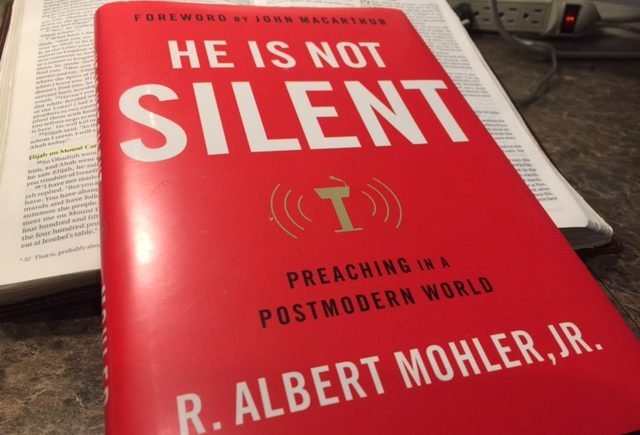
Once you begin a book or blog by Al Mohler, it’s hard to stop reading. His unfiltered insights are incisive, whether he’s talking about today’s world or today’s church. I thoroughly enjoyed his book on preaching, He Is Not Silent. These are the sentences I underlined and a few I bolded:
- A large number of younger evangelical pastors today are unabashedly committed to biblical exposition—page 15.
- This new generation is proving once again that the effective and faithful exposition of the Word of God draws persons to Christ and leads to spiritual growth and to the health of the church—page 16.
- Urged on by devotees of “needs-based” preaching, many evangelicals have abandoned the text without recognizing that they have done so—page 20.
- Preaching is essentially an act of worship… God seeks worshipers who will worship Him in spirit and truth—page 24.
- A theology of preaching should take Trinitarian form, reflecting the very nature of the self-revealing God. In so doing, it bears witness to the God who speaks, the Son who saves, and the Spirit who illuminates—page 40.
- The preacher dares to speak the Word of truth to a generation that rejects the very notion of objective, public truth—page 41.
- In the Old Testament alone, the phrases “the Lord said,” “the Lord spoke,” and the word of the Lord came” appear at least 3,808 times—page 41.
- If you picked an evangelical church at random and attended a Sunday morning service there, how likely is it that you would hear a faithful expository sermon, one that takes its message and its structure from the biblical text?—page 50.
- For Israel, God’s Word was like the manna in the wilderness. They needed it every day, fresh and new, if they were to survive at all—verse 62.
- Expository preaching is that mode of Christian preaching that takes as its central purpose the presentation and application of the text of the Bible….—page 65.
- As the Word of God, the text of Scripture has the right to establish both the substance and the structure of the sermon—page 65.
- Many preachers—from Harry Emerson Fosdick onward—assume that they must begin with a human problem or question and then work backward to the biblical text. On the contrary, expository preaching begins with the text and works from the text to apply its truth to the lives of believers—page 66.
- One of the reasons I encourage pastors to preach through entire books of the Bible is because the practice will force us to preach texts we otherwise would never preach—page 96.
- When truth is denied, therapy remains. The critical question shifts from “What is true?” to “What makes me feel good?”—page 121